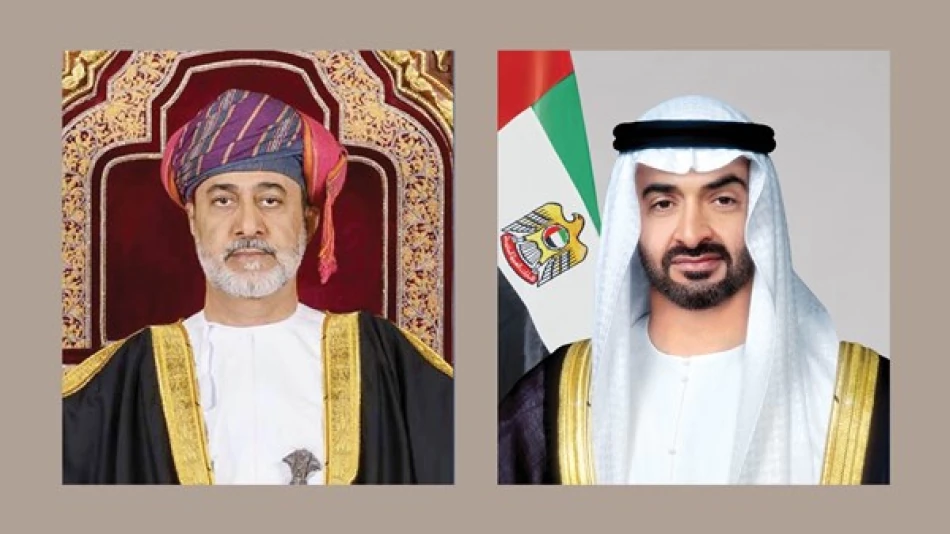
UAE President and Oman Sultan Discuss Bilateral Ties and Regional Developments
UAE and Oman Leaders Reinforce Gulf Unity Amid Regional Tensions
UAE President Sheikh Mohammed bin Zayed Al Nahyan and Oman's Sultan Haitham bin Tarik held strategic talks focusing on bilateral cooperation and shared concerns over Middle East developments, particularly the Palestinian situation. The high-level diplomatic engagement underscores the Gulf states' coordinated approach to regional stability as geopolitical pressures intensify across the region.
Strengthening the UAE-Oman Partnership
The phone conversation between the two leaders centered on expanding cooperation frameworks that serve mutual interests and benefit both nations' populations. This dialogue represents the continuation of a robust bilateral relationship that has seen significant growth in recent years, particularly in trade, energy, and infrastructure development.
The UAE and Oman have increasingly positioned themselves as complementary economic partners, with the UAE serving as a global financial hub while Oman offers strategic geographic advantages and growing industrial capabilities. Their combined approach has proven particularly effective in navigating global supply chain disruptions and regional economic challenges.
Regional Security and Palestinian Support
Two-State Solution Advocacy
Both leaders reaffirmed their support for the Palestinian people and emphasized the critical importance of international efforts to preserve and advance the two-state solution. They characterized this approach as the only viable path to achieving just and comprehensive peace in the region.
This position aligns with broader Gulf Cooperation Council policies, though it comes at a time when regional dynamics have shifted significantly. The Abraham Accords have reshaped diplomatic relationships in the Middle East, while ongoing tensions continue to challenge traditional peace frameworks.
Strategic Implications for Gulf Stability
The timing of these discussions reflects growing regional concerns about escalating tensions and their potential economic impact. Both the UAE and Oman have invested heavily in positioning themselves as stable, business-friendly environments that can weather regional storms.
For international investors and multinational corporations, the coordinated stance of these Gulf states provides reassurance about policy continuity and regional cooperation mechanisms. This stability becomes particularly valuable as global supply chains seek reliable Middle Eastern partners.
Cultural and Religious Diplomacy
The leaders also exchanged congratulations on the occasion of the Prophet's Birthday, using this religious observance to call for stability and peace for Muslim communities and the world at large. Such cultural diplomacy reinforces the soft power approach both nations employ in regional affairs.
This emphasis on shared Islamic values while maintaining pragmatic international relationships exemplifies the modern Gulf approach to diplomacy—balancing traditional cultural identity with contemporary geopolitical realities.
Looking Forward: Economic and Strategic Partnerships
The strengthened UAE-Oman relationship represents a microcosm of broader Gulf integration efforts. As both countries continue diversifying their economies away from oil dependence, their cooperation in sectors like renewable energy, logistics, and technology becomes increasingly significant.
For regional observers, this partnership demonstrates how Gulf states are adapting to changing global dynamics while maintaining stability and growth. The combination of Oman's strategic location and natural resources with the UAE's financial expertise and global connectivity creates a powerful regional bloc that can influence broader Middle Eastern developments.
Most Viewed News

 Layla Al Mansoori
Layla Al Mansoori






